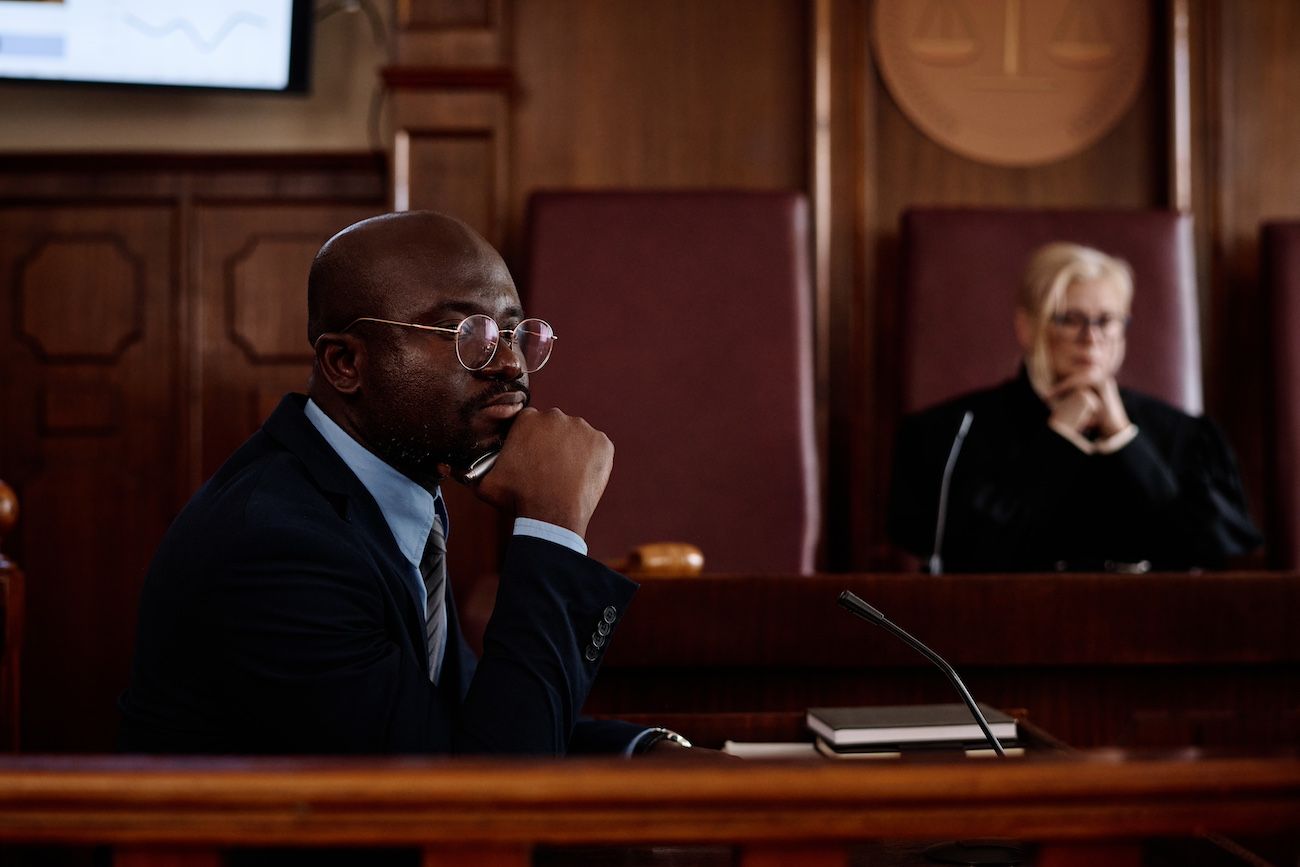Is it Okay to Talk to the Insurance Company After a Car Accident in Missouri?
About the Author
Ethan Charles (“EC”) Duckworth is the founding attorney of Duckworth Injury Law. EC earned his law degree from the University of Missouri - Columbia, where he graduated in the top 10 of his class and served as an Editor of the Missouri Law Review. EC currently serves as a member of the Missouri Association of Trial Attorneys (MATA) and is a graduate of the Ross T. Roberts Trial Academy. EC has represented hundreds of injury victims throughout his career resulting in tens of millions of dollars in compensation recovered. EC has handled personal injury cases all over Missouri, from Hannibal to the Bootheel, from Joplin to St. Joseph, and from Kansas City to St. Louis. Follow EC Duckworth on LinkedIn.

Before You Speak to Any Insurance Company, Consult With a Car Accident Laywer in Missouri First
After a car accident, the insurance companies for both you and the other driver will likely reach out to you quickly. But is it okay for you to talk to the insurance company on your own after a car accident in Missouri?
Generally, we advise our clients not to speak with any insurance company until after consulting with an attorney. Your conversations with the insurance company are typically recorded, and any statements you make regarding how the crash occurred, your injuries, or your willingness to settle your claim will be used against you down the road.
The At-Fault Party’s Insurance Company’s Priority is to Protect Itself – Not You
Insurance companies are for-profit entities. In order to make a profit, auto insurance companies must bring in more premium payments from their insureds than the claim payments they pay out. As such, when a claim is brought by you against an insurance company’s insured, the insurance company’s first priority is limiting its own exposure on the claim (i.e., gathering evidence to defend the claim in order to pay as little as possible). While insurance companies often frame this as protecting their insureds (insurance companies have a duty to defend and indemnify their insureds from liability), in reality, these insurance companies simply want to maximize their own profits.
While injury victims often understand this concept when it comes to the at-fault party’s insurance company, the same is true when it comes to your own auto insurance company as well. Your own auto insurer will want to limit its own exposure on first-party insurance coverage such as Collision Coverage, Medical Payments Coverage, Uninsured Motorist Coverage, and/or Underinsured Motorist Coverage.
Missouri Law Permits Evidence Regarding Statements Against Interest
While generally out of court statements are excluded from evidence at trial as inadmissible hearsay, statements made by a party are often admissible as an admission of a party opponent and/or as a statement made against interest. In other words, the well-known criminal Miranda warning (“anything you say can and will be used against you in the court of law”) is applicable to the civil personal injury world as well.
As such, following an injury causing car accident, the at-fault driver’s insurance company will reach out to you as soon as possible to lock down your story. They will often ask leading questions, getting you to make admissions as to fault and/or damages. These conversations are recorded and can typically be used to impeach your testimony in a deposition or at trial in the future.
Insurance Companies May Set Reserves Based Upon Your Statements
In addition to getting you to say things you shouldn’t say after a car accident, insurance companies also use your recorded statements to set “reserves” on your personal injury claim. A reserve is a set dollar amount that the insurance company sets aside to cover its future obligations to claimants after an injury causing accident. These reserves are typically set at an amount that the insurance company believes will be sufficient to settle your case.
In setting a reserve, the adjuster for the other party’s auto insurance company will estimate the amount needed to pay for your damages, including your medical bills, lost income, pain and suffering, etc. This reserve then correlates with the adjuster’s settlement authority on the claim. While reserves can be adjusted as additional information and evidence develops in your claim, the adjuster will typically need to present justification to his/her supervisor to do so. As such, it’s in your best interest for the insurance company to not set a low reserve to begin with. Instead, your injury lawyer can present evidence supporting your damages to the adjuster when appropriate, helping ensure the insurer does not set an inadequately low reserve.
Insurance Companies May Trick You into Settling Your Claim Prematurely
Prior to hiring an attorney for your personal injury claim, the at-fault insurance company will likely try to get you to settle your injury claim. The insurance company will present an offer quickly, as they understand you are in a vulnerable position (likely needing money to cover out of pocket expenses like medical bills, rental invoices, and lost wages) and they understand they will have to pay significantly more if a good injury lawyer gets involved.
When presenting you with a settlement offer prior to you having legal representation, the insurance company will often make an empty offer, in which they will agree to make a small payment to you, with a much larger amount being “set aside” for your future medical expenses. While this may sound good in theory, the only amount you will actually receive is the small payment for your pain and suffering. The amount “set aside” is often never paid – or if it is paid, it’s paid directly to medical providers or health insurance lien holders.
Far too often, we see accident victims who have agreed to such settlements prior to consulting with legal counsel, only to be left with significant uncompensated damages and no recourse for pursuing additional money against the defendant or his insurance company.
Your Attorney Can Advise as to When You May Speak with an Insurance Company
From time to time, it is necessary to speak with an insurance company after a Missouri personal injury causing car, truck, or motorcycle accident. However, these conversations should only occur after you have met with an experienced Missouri personal injury lawyer. Your PI attorney will tell you under what circumstances it’s okay to speak with an insurance company and what you can/cannot discuss with the insurance company on your call.
For example, after your car accident lawyer has sent a Letter of Representation to the defendant’s insurance company, your lawyer may permit you to speak with the defendant’s insurance company for the limited purpose of resolving your property damage claim. In this situation, the property adjuster for the insurance company may speak with you to arrange repair/payment for your damaged vehicle but may not speak with you about your injuries or the facts of how the accident occurred.
Further, in many first-party insurance claims (claims made against your own auto insurance policy), your policy likely requires you to “cooperate” with your insurance company and to provide a recorded statement upon their request. These claims often involve Collision Coverage, Medical Payments Coverage, Uninsured Motorist Coverage, and Underinsured Motorist Coverage made under your own auto insurance policy. If your own auto insurance company requests a recorded statement, your personal injury lawyer will likely prepare you for the call and will be on the call with you and the insurance adjuster. Failure to provide a recorded statement on a first-party claim with your own insurance company can potentially lead to a denial of your claim.
Find a Skilled Personal Injury Attorney Like Duckworth Injury Law Before You Speak to an Insurance Company Following a Car Accident in Missouri
If you or a loved one has been injured in a car, truck, motorcycle, or boat accident anywhere in Missouri, odds are the insurance company will be reaching out to you ASAP. Providing a statement to the defendant’s insurance company can seriously harm your case, resulting in a significantly lower settlement or judgment on your behalf.
Located in the heart of Missouri in Columbia, MO, Duckworth Injury Law is proud to serve as The Missouri Personal Injury firm and as Missouri’s go-to car accident lawyer, motorcycle accident lawyer, truck accident lawyer, boat accident lawyer, slip and fall lawyer, or dog bite lawyer.
If you’ve been contacted by the at-fault party’s insurance company, you need to speak with an experienced injury lawyer prior to providing any statement. Reach out to Duckworth Injury Law today for a free consultation on your Missouri personal injury case.











